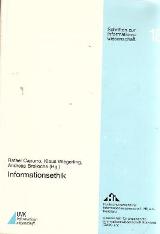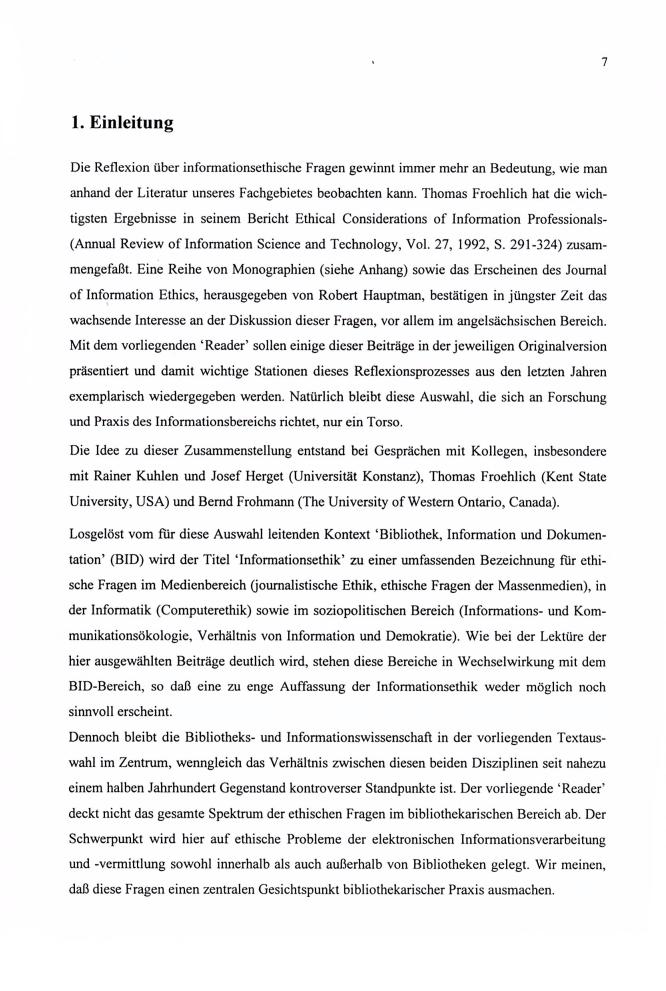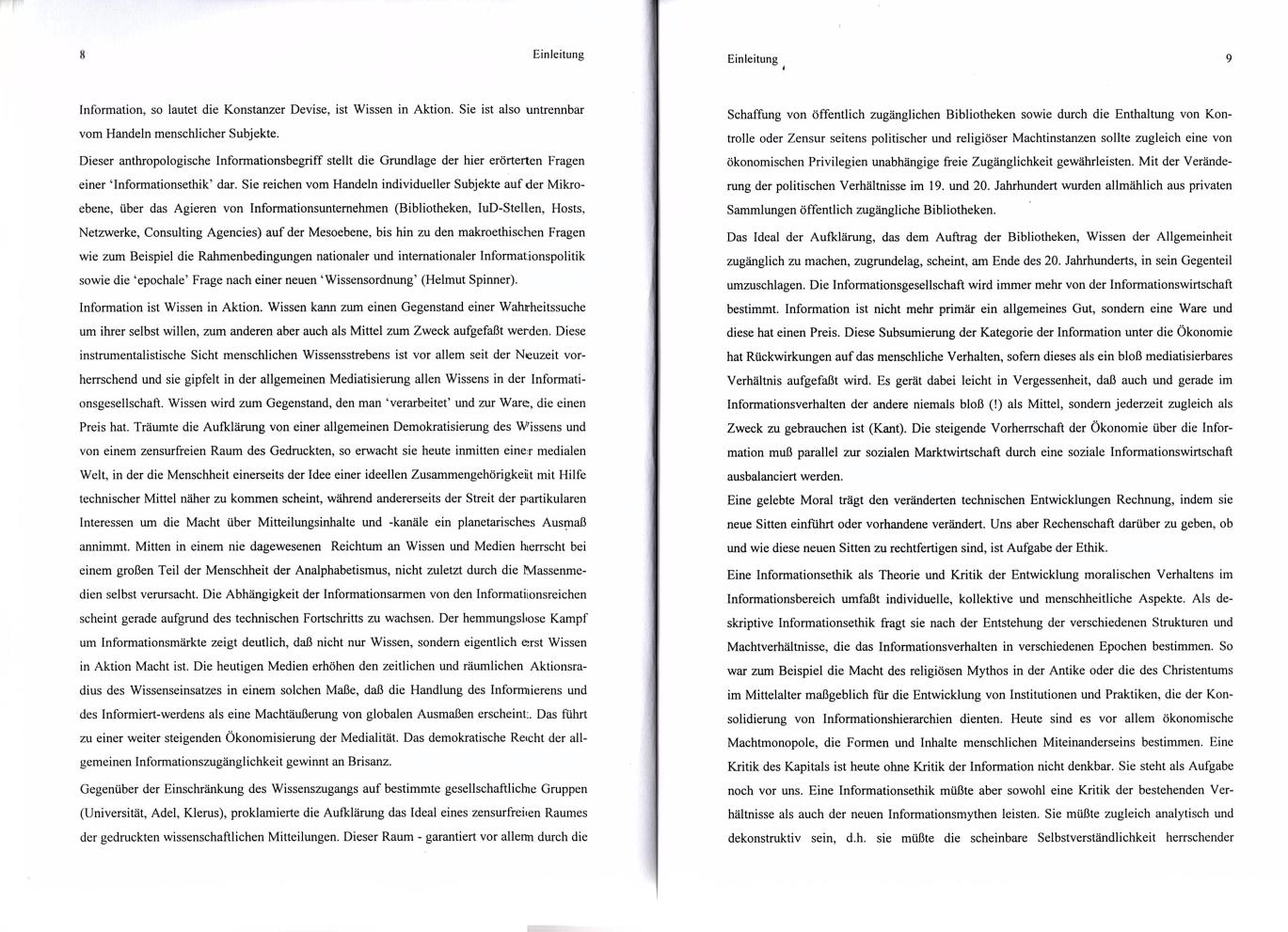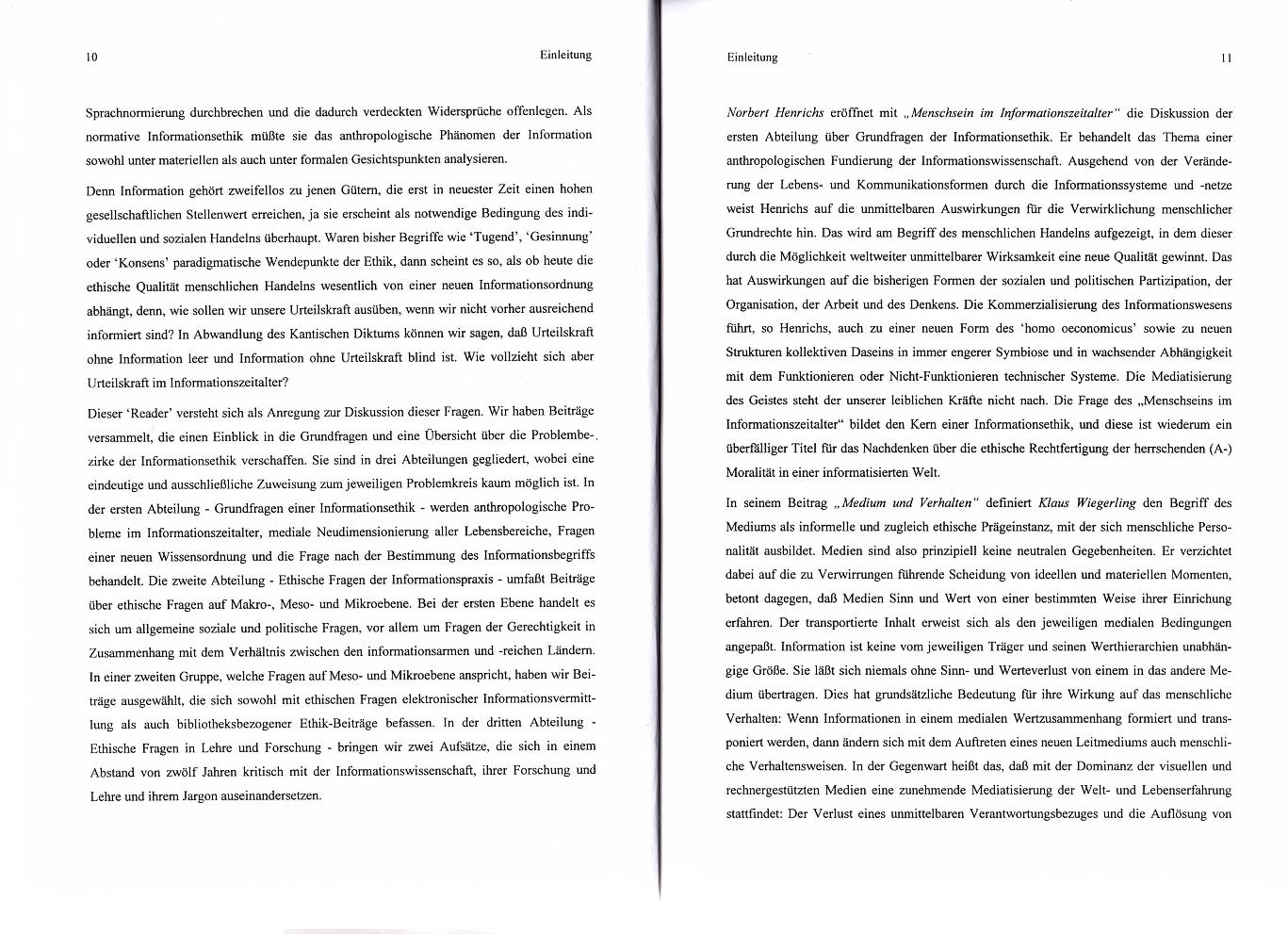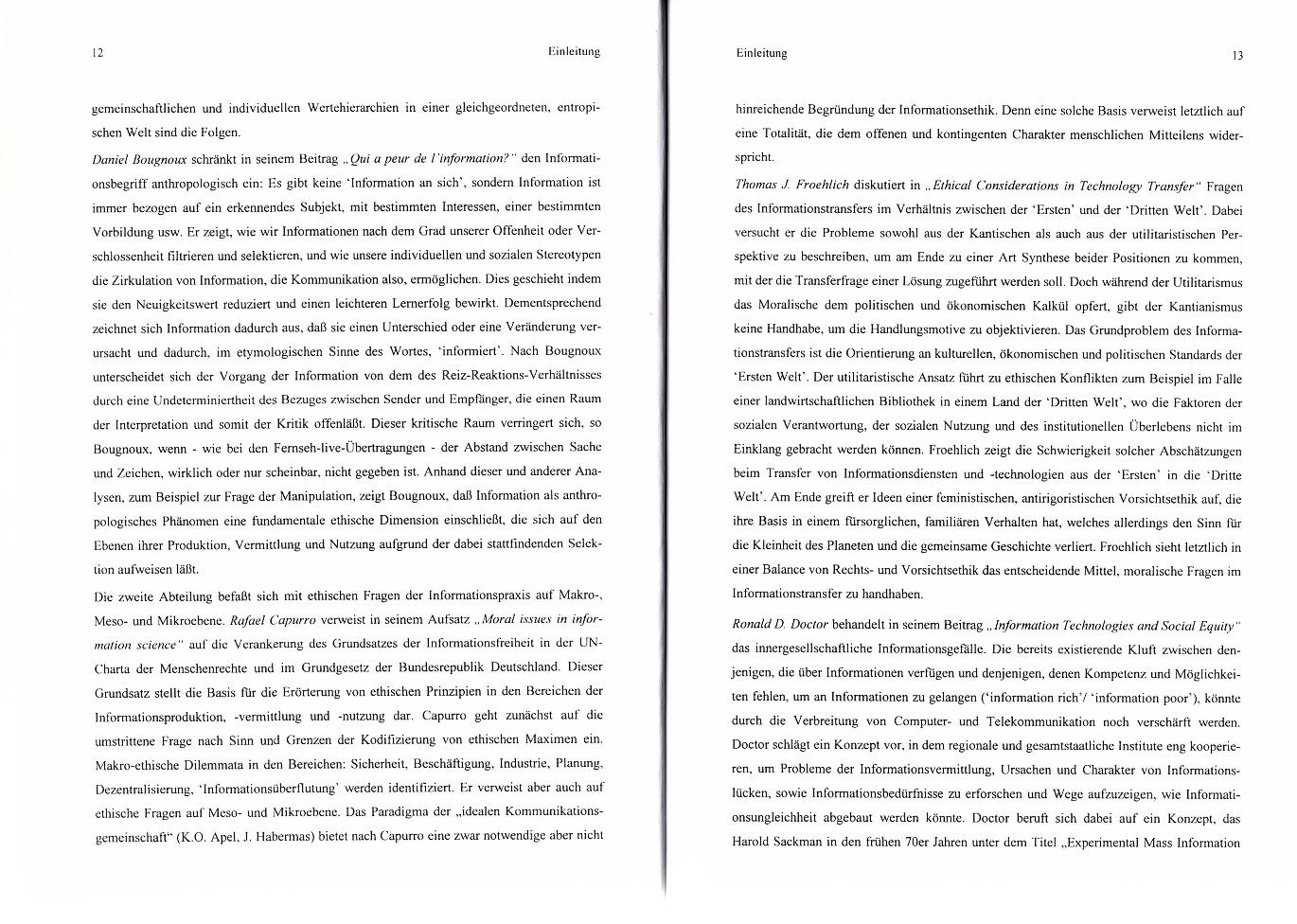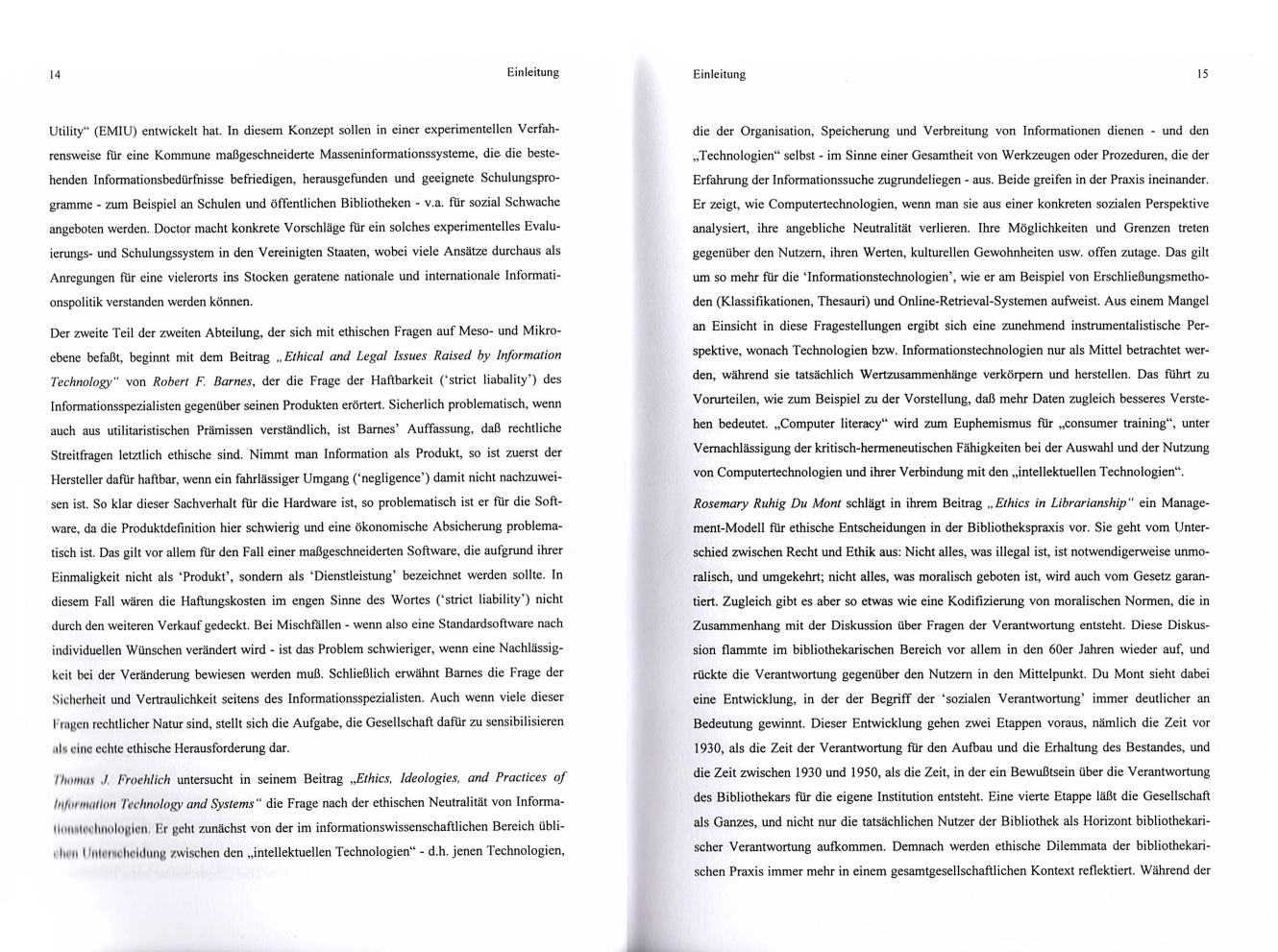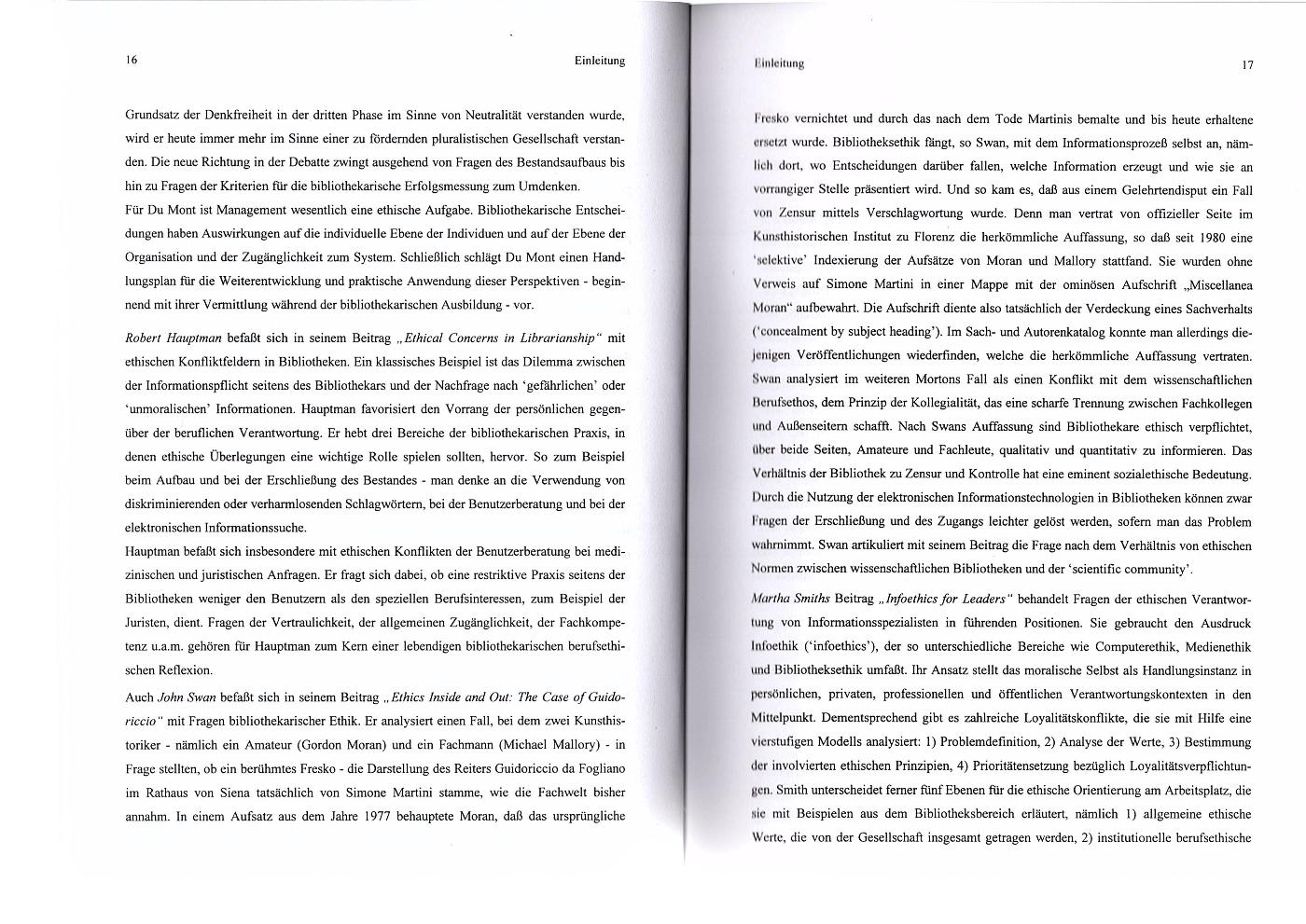5.
Ethik-Kodizes
ASIS
Professional Guidelines
American
Library Association: Code of Ethics
Ethische
Leitlinien der Gesellschaft für Informatik
EUSIDIC:
Collected Guidelines and Codes of Practice
ASIS
Professional Guidelines
Dedicated
to the Memory of Diana Woodward
The
following set of "Professional Guidelines" was adopted for t-he ASIS
membership
by the Board of Directors in July 1993, finalizing a process involving
Professionalism Committees, the ASIS Board of Directors and ASIS' legal
counsel for more than a decade.
ASIS
recognizes the plurality of uses and users of information technologies,
services, systems and products, as well as the diversity of goals or
objectives,
sometimes conflicting, among producers, vendors, mediators and users of
information systems.
ASIS
urges its members to be ever aware of the social, economic, cultural
and
political impacts of their actions or inaction.
ASIS
members have obligations to employers, clients and systems users, to
the
profession and to society, to use judgement and discretion in making
choices,
providing equitable service and in defending the rights of open
inquiry.
Responsibilities
to Employers/Clients/System Users
To act
faithfully for their employers or clients in professional matters
To uphold
each user's, provider's or employer's right to privacy and
confidentiality
and to respect whatever proprietary rights belong to them by limiting
access
to, providing proper security for and ensuring proper disposal of data
about clients, patrons or users.
To treat
all persons fairly.
Responsibility
to the Profession
- To truthfully
represent themselves and the information systems which they utilize or
which they represent by
- not knowingly
making false statements or providing erroneous or misleading
information
- informing
their employers, clients or sponsors of any circumstances that create a
conflict of interest.
- not using
their positions beyond their authorized limits or by not using
their
credentials to misrepresent themselves
- following
and promoting standards of conduct in accord with the best
current practices
- undertaking
their research conscientiously, in gathering, tabulating or
interpreting
data; in following proper appro-val procedures for subjects; and in
producing
or disseminating their research results
- pursuing
ongoing professional development and encouraging and assisting
colleagues
and others to do the same
- adhering
to principles of due process and equality of opportunity.
Responsibility
to Society
- To improve
the information systems with which they work or which they represent to
the best of their means and abilities by
- providing
the most reliable and accurate information and acknowledging the
credibility
of the sources as known or unknown
- resisting
all forms of censorship, inappropriate selection and acquisition
policies
and biases in information selection, provision and dissemination
- making
known any biases, errors and inaccuracies found to exist and striving
to
correct those which can be remedied.
- To promote
open and equal access to information, within the scope permitted by
their
organizations or work, and to resist procedures that promote unlawful
discriminatory
practices in access to and provision of information by
- seeking
to extend public awareness and appreciation of in-formation
availability
and provision as well as the role of information professionals in
providing
such information
- freely
reporting, publishing of disseminating information subject to legal and
proprietary restraints of producers, vendors and employers, and the
best
interests of their employers or clients.
Information
professionals shall engage in principled conduct whether on their own
behalf
or at the request of employers, colleagues, clients, agencies or the
profession.
(Bulletin
of the American Society for Information Science 20(2):4
(December/January),
1994)
American
Library Association
Code of
Ethics
1) Librarians
must provide the highest level of service through appropriate and
usefully
organized collections, fair and equitable circulation and service
policies,
and skillful, accurate, unbiased, and courteous responses to all
requests
for assistance.
2)
Librarians must resist all efforts by groups or individuals to censor
library
materials.
3)
Librarians must protect each user's right to privacy with respect to
information
sought or received, and materials consulted, borrowed, or
acquired.
4)
Librarians must adhere to the principles of due process and equality of
opportunity in peer relationships and personnel actions.
5)
Librarians must distinguish clearly in their actions and statements
between
their personal philosophies and attitudes and those of an institution
or
professional body.
6)
Librarians must avoid situations in which personal interests might be
served
or financial benefits gained at the expense of library users,
colleagues,
or the employing institution.
(Adopted
June 30, 1981, by ALA Membership and ALA Council)
American
Libraries, 13: 595 (October 1982)
Ethische
Leitlinien der Gesellschaft für Informatik
Präambel
Das
Handeln von Informatikerinnen und Informatikern steht in Wechselwirkung
mit unterschiedlichen Lebensformen und -normen, deren besondere Art und
Vielfalt sie berücksichtigen sollen und auch wollen.
Dementsprechend
sind diese Leitlinien nicht nur ethische Forderungen; sie sind zugleich
Ausdruck des gemeinsamen Willens, diese Wechselwirkungen als
wesentlichen
Teil des eigenen individuellen und institutionellen beruflichen
Handelns
zu betrachten. Der offene Charakter dieser Forderungen wird mit dem
Begriff
Leitlinien unterstrichen.
Die
Gesellschaft für Informatik (GI) will mit diesen Leitlinien
bewirken,
daß berufsethische Konflikte Gegenstand gemeinsamen Nachdenkens
und
Handelns werden. Ihr Interesse ist es, ihre Mitglieder, die sich mit
verantwortungsvollen
Verhalten exponiert haben, zu unterstützen. Vor allem will sie den
Diskurs über ethische Fragen in der Informatik mit der
Öffentlichkeit
aufnehmen und Aufklärung leisten.
Handlungsalternativen
und ihre absehbaren Wirkungen fachüber-greifend zu thematisieren,
ist in einer vernetzten Welt eine notwendige Aufgabe; hiermit sind
einzelne
zumeist überfordert. Deshalb hält die GI für
unerläßlich,
die Zusammenhänge zwischen individueller und kollektiver
Verantwortung
zu verdeutlichen und dafür Verfahren zu entwickeln. Im Sinne
dieser
Ausführungen bindet sich die GI an die folgenden
Leitlinien.
I Das
Mitglied
Art.
1: Fachkompetenz
Vom
Mitglied wird erwartet, daß es seine Fachkompetenz nach dem Stand
von Wissenschaft und Technik ständig verbessert.
Art.
2: Sachkompetenz
Vom
Mitglied wird erwartet, daß es sich über die Fachkompetenz
hinaus
in die seinen Aufgabenbereich betreffenden Anwendungen von
Informatiksystemen
soweit einarbeitet, daß es die Zusammenhänge versteht. Dazu
bedarf es der Bereitschaft, die Anliegen und Interessen der
verschiedenen
Betroffenen zu verstehen und zu berücksichtigen.
Art.
3: Juristische Kompetenz
Vom
Mitglied wird erwartet, daß es die einschlägigen rechtlichen
Regelungen kennt, einhält und an ihrer Fortschreibung
mitwirkt.
Art.
4: Kommunikative Kompetenz und Urteilsfähigkeit
Vom
Mitglied wird erwartet, daß es seine Gesprächs- und
Urteilsfähigkeit
entwickelt, um als Informatikerin oder Informatiker an
Gestaltungsprozessen
und interdisziplinären Diskussionen im Sinne kollektiver Ethik
mitwirken
zu können.
II
Das Miglied in einer Führungsposition
Art.
5: Arbeitsbedingungen
Vom
Mitglied in einer Führungsposition wir zusätzlich erwartet,
daß
es für Arbeitsbedingungen Sorge trägt, die es
Informatikerinnen
und Informatikern erlauben, ihre Aufgaben am Stand der Technik kritisch
zu überprüffen.
Art.
6: Beteiligung
Vom
Mitglied in einer Führungsposition wird zusätzlich erwartet,
daß es dazu beiträgt, die von der Einführung von
Informatiksystemen
Betroffenen an der Gestaltung der Systeme und ihrer
Nut-zungsbedingungen
angemessen zu beteiligen. Von ihm wird insbesondere erwartet, daß
es keine Kontrolltechniken ohne Beteiligung der Betroffenen
zuläßt.
Art.
7: Organisationsstrukturen
Vom
Mitglied in einer Führungsposition wird zusätzlich erwartet,
aktiv für Organisationsstrukturen und kommunikative Verfahren
einzutreten,
die die Wahrnehmung von Verantwortung im sinne kollektiver Ethik
ermöglichen.
III
Das Mitglied in Lehre und Forschung
Art.
8
Vom
Mitglied, das Informatik lehrt, wird zusätzlich erwartet,
daß
es die Lernenden auf deren Verantwortung sowohl im individuellen als
auch
im kollektiven Sinne vorbereitet und selbst hierbei Vorbild
ist.
IV
Die Gesellschaft für Informatik
Art.
9: Zivilcourage
Die
GI ermutigt ihre Mitglieder in Situationen, in denen deren Pflichten
gegenüber
ihrem Arbeitgeber oder einem Kunden im Konflikt zur Verantwortung
gegenüber
Betroffenen stehen, mit Zivil-courage zu handeln.
Art.
10: Mediation
Die
GI übernimmt Vermittlungsfunktionen, wenn Beteiligte in
Konfliktsituationen
diesen Wunsch an sie herantragen.
Art.
11: Interdisziplinäre Diskurse
Die
GI ermöglicht interdisziplinäre Diskurse zu ethischen
Problemen
der Informatik; die Auswahl der Themen wird selbst in solchen Diskursen
getroffen. Vorschläge hierzu können einzelne Mitglieder und
Gliederungen
der GI machen. Die Ergebnisse der Diskurse werden
veröffentlicht.
Art.
12: Fallsammlung
Die
GI legt eine allgemein zugängliche Fallsammlung über
ethi-sche
Konflikte an, kommentiert und aktualisiert sie
regelmäßig.
Art.
13: Ehrenrat
Die
ethischen Leitlinien unterstützen den Ehrenrat nach § 11 der
Satzung der GI in seinen Aufgaben und Entscheidungen.
Art.
14: Fortschreibung
Die
ethischen Leitlinien werden regelmäßig
überarbeitet.
Erläuterungen
Betroffener
Der
Begriff wird in den Datenschutzgesetzen definiert als die
natürliche
Person, über die Daten etwas aussagen. Er umfaßt sowohl
organisationsinterne
(Beschäftigte, Nutzer) als auch organisationsexterne Personen
(Bürger,
Kunden). Es empfiehlt sich, diesen eingebürgerten Begriff für
jegliche Form des Einsatzes von Informatiksystemen zu übernehmen.
Die im englischen Sprachraum gebräuchliche Unterscheidung von
"user"
(intern) und "usee" (extern) hat sich in Deutschlad bis jetzt nicht
durchsetzen
können.
Diskurs
Diskurse
sind Verfahren gemeinschaftlicher Reflexion von Proble-men mit einem
normativen,
d.h. wertbezogenen Hintergrund, die vom einzelnen oder einer einzelnen
Fachdisziplin nicht überschaut werden können. Ihre
wesentliche
Leistung liegt darin, in der fachübergreifenden Kommunikation
Erkenntnis-
und Verständnisgrenzen zu überwinden sowie Vor-Urteile zu
hinterfragen
und im Licht anderer Positionen zu rechtfertigen oder zu modifizieren,
um Verständigung zu ermöglichen. Allein die Überwindung
der Sprachbarrieren erweist sich als langwieriges Problem. Deshalb
sollen
Diskurse auf eine mittelfristige Dauer angelegt sein.
Fallsammlung
Unter
Fallsammlung wird eine Zusammenfassung von wirklichen Begebenheiten
verstanden,
in denen Beschäftigte (vorzugsweise Informatikerinnen und
Informatiker)
durch die ihnen übertragenen Aufgaben in ethische Konflikte
geraten
sind. Der Arbeitskreis "Informatik und Verantwortung" der GI wird diese
Fälle zusammentragen und kommentieren. Die Sammlung hat den Sinn,
diese Leitlinien zu konkretisieren und sie anhand praktischer Beispiele
besser vermittelbar zu machen. Einzelne können diese Beispiele in
vergleichbaren Situationen als Leitlinie für ihr Verhalten zu Rate
ziehen.
Informatiksystem
Unter
einem Informatiksystem wird die Einheit von Hard-, Software und Netzen
einschließlich aller durch sie intendierten oder verursachten
Gestaltungs-
und Qualifizierungsprozesse bezügl. Arbeit und Organisation
verstanden..
Kollektive
Ethik
Ethik
befaßt sich mit dem vorbedachten Verhalten von Menschen, die die
Folgen ihres Verhaltens für andere Menschen, ihre
Mit-geschöpfe
und die Umwelt in noch unerfahrenen, durch Sitten und Rechtsnormen noch
nicht geprägten Situationen bedenken (reflektieren). Hierbei
können
die Folgen des Verhaltens unmittelbar oder über längere
Zeiten
und größere Räume zu bedenken sein. Was der einzelne
Mensch
hinsichtlich dieser Verhaltensfolgen bedenken kann, umfaßt die
individuelle
Ethik.
Für
den einzelnen Menschen sind aber nicht immer die Folgen von Verhalten
in
Kollektiven (Organisationen, Gruppen, Wirtschaften und Kulturen)
überschaubar.
Kollektives Verhalten bedarf deshalb zusätzlich zur individuellen
der kollektiven Reflexion. Kollektive Ethik beruht auf der
Möglichkeit,
mit "Vorsicht" künftige kollektive Handlungen, die sich nicht an
Erfahrungen
und daraus entwickelten Normen orientieren können,
gemeinschaftlich
zu bedenken. Eine besondere Notwendigkeit solcher Reflexion ergibt sich
immer dann, wenn individuelle Ethik oder Moral mit der kollektiven
Ethik
in Konflikt geraten.
Kontrolltechnik
Unter
Kontrolltechnik werden analog zum Betriefsverfassungsgesetz "technische
Einrichtungen" verstanden, die objektiv geeignet sind, "das Verhalten
oder
die Leistung der Arbeitnehmer zu überwachen" (§ 87 Abs.1 Nr.6
BetrVG). Bei der Einführung solcher Systeme steht den
Interessenvertretungen
ein Mitbestimmungsrecht zu.
Mediation
Unter
Mediation werden Verhandlungsprozesse verstanden, mit deren Hilfe
Interessenkonflikte
zwischen zwei oder mehreren Parteien unter Hinzuziehung eines neutralen
Dritten (Mediator) beigelegt werden. Das Ziel sind
Problemlösungen,
die von allen am Prozeß Beteiligten akzeptiert werden. Der
Mediationsprozeß
ist durch die Suche nach neuen Lösungen gekennzeichnet. Die
Ergebnisse
sind nicht rechtlich verpflichtend; als erfolgreich erweisen sich
allgemein
"jeder-gewinnt-Lösungen".
Rechtliche
Regelungen
Rechtliche
Regelungen, die für die Gestaltung von Informatiksystemen
bedeutsam
sind, finden sich inzwischen an zahlreichen Stellen der Rechtsordnung.
Die wichtigsten sind:
Allgemeiner
und bereichsspezifischer Datenschutz, einschließ-lich
Arbeitnehmerdatenschutz
Freedom
of information - Gesetzgebung (Informationszugangsgesetze, z.B.
für
den Umweltbereich)
Computerstrafrecht
Gewerblicher
Rechtsschutz, insbesondere Urheber- und Patentrecht
Allgemeine
zivilrechtliche und strikte Produkthaftung
IT-Sicherheitsrecht
Telekommunkationsrecht
In vielen,
bei weitem aber nicht in allen Fällen begründet die
Einhaltung
technischer Normen und Standards (DIN, EN, ISO) die Vermutung der
Rechtstreue.
Stand
der Wissenschaft und Technik
Die
Leitlinien wären schon bei ihrer Verkündung veraltet, wenn
man
sie auf eine schon bekannten Wissensfundus in der Informatik
bezöge.
Statt starrer Verweise bietet sich als Ausweg an, das Prinzip der sog.
offenen normativen Standards zu übernehmen, fürdas sich das
deutsche
technische Sicherheitsrecht entschieden hat. Das
Bundesverfassungsgericht
hat dieses Prinzip in mehreren Grundsatzentscheidungen zu einer sog.
"Dreistufenlehre"
konkretisiert (BVerfGE 49,89ff., BVerfGE 53,30ff., BVerfGE
56,54ff.):
1.
Stufe: Allgemein anerkannte Regeln der Technik
Eine
Regel ist dann allgemein anerkannt, wenn die herrschende Meinung der
Praktiker
eines Fachgebiets von ihrer Richtigkeit überzeugt ist und dies
auch
dokumentiert hat. Die Regel muß in der Fachpraxis
bewährt
und erprobt sein. Maßgebend ist die Durchschnittsmeinung der
Praktiker,
abweichende Auffassungen von Minderheiten sind unerheblich. Eine starke
faktische Vermutung für die allgemeine Anerkennung besteht, wenn
z.B.
DIN- oder ISO-Normen für das Problem existieren.
2.
Stufe: Stand der Technik
Der
Maßstab für das Gebotene wird an die Front der technischen
Entwicklung
verlagert, für die die allgemeine Anerkennung und die praktische
Bewärung
alleine nicht ausreicht. Bei dieser Formel müssen
Meinungsverschiedenheiten
unter technischen Praktikern ermittelt werden. Die meisten
Datenschutzgesetze
enthalten in ihren Datensicherungsvorschriften einen Hinweis auf den
"Stand
der Technik (und Organisation)".
3.
Stufe: Stand von Wissenschaft und Technik
Mit
der Bezugsnahme auf diese Formel wird ein noch stärkerer Zwang
dahin
ausgeübt, daß eine Regel mit der wissenschaftlichen und
technischen
Entwicklung Schritt hält. Geboten ist, was nach neuesten
wissenschaftlichen
Erkenntnisssen für erforderlich gehalten wird. Das jeweils
Erforderliche
wird also nicht durch das technisch gegenwärtige Machbare
begrenzt.
Einen Verweis auf den "Stand von Wissenschaft und Technik" enthält
z.B. das Pro-dukthaftungsgesetz von 1989, das zumindest für
Standardsoftware
anwendbar ist. Es bietet sich an, an die Fachkompetenz der
In-formatiker
besonders hohe Maßstäbe anzulegen (3. Stufe). Bei der
Realisierung
von Informatiksystemen müßte es im allgemeinen ausreichen,
die
Erwartungen, wie sie z.B. Datenschutzgesetze an Informatiker haben,
jedenfalls
nicht zu unterschreiten.
(Informatik-Spektrum
16 (1993) 4, 239-240)
EUSIDIC
(The European Association of Information Services)
Collected
Guidelines and Codes of Practice
(Auszug/Selection)
INFORMATION
BROKERS (2)
Introduction
As
part of the Impact (Information Market Policy Actions) Pro-gramme the
Commission
of the EC has supported the work of EUSIDIC, the European Association
of
Information Services, EIIA, the European Information Industry
Association,
and EIRENE, the European Information Researchers Network, in producing
a Code of Practice for Information Brokers. This work was untertaken by
members of the three bodies, supported by staff of the School of
Information
Studies of the University of Central England in Birmingham.
The
three principal organisations concerned with the professional
development
of information brokers and with the promotion of their role, EIRENE,
the
European Information Researchers Network, AFII, Association
Française
des Intermédiaires en Information, and DGD, the Deutsche
Gesellschaft
für Dokumentation, have undertaken to adopt the code and to put in
place procedures to ensure adherence within their
organisations.
The
reason for creating this Code of Practice is to allow users of the
services
of Information Brokers to feel confident that there exists a framework
of professional ethics which governs provision of these
services.
The
Broker/client relationship should be of such a nature that it fosters
confidence
and mutual respect and is characterised by honesty and
confidentiality.
In
offering to provide services, a professional Information Broker implies
that there is a level of competence and the range of skills and
experience
available to carry out the work.
Information
Broking is the generic term for a person or organisation contracting to
provide information services. There are several terms in use by people
in the field:
information
broker
information
consultant
freelance
librarian
information
specialist
information
on demand
fee-based
information service
information
retailer
infomediary
Generally,
an Information Broker is seen as someone providing information services
for profit.
The
working structures fall into two main categories:
Idependent
Information Broker whose main source of income is gained by
selling information services
Fee-based
services attached to a privately or publicly owned
organisation
Definitions
There
are several definitions of the term Information Broker used by
different
organisations:
an
individual or organisation who - on demand - seeks to
answer
questions using all sources available and who is in business for a
profit
(ASIS Bulletin 2, (7) special issue, Fe-bruary 1976)
an individual
or organisation carrying out information sear-ches on behalf of a third
party, individual or organisation (EUSIDIC, 1984)
an individual
or organisation who - on demand - seeks to answer questions using all
sources
available and who is in business for a profit (EIRENE, 1993)
Note
This
Code of Practice is designed to apply to individuals acting as
Information
Brokers, regardless of whether they work individually or as part of a
company.
It is anticipated that Information Brokers will incorporate this Code
of
Practice as part of their company policy.
A:
ETHICAL PRINCIPLES
Integrity
A Broker
shall:
uphold
the good standing and reputation of professional Information Brokers
be honest
in performing professional services
conduct
business activities with courtesy, integrity and humanity
show respect
for:
individuals
professional
colleagues
the client
the scholarship
of others
the law
A Broker
shall not:
knowingly
encourage discrimination, on the grounds of race, colour, creed, gender
or sexual orientation
claim
to offer services or subject coverage which cannot be provided
deliberately
misrepresent themselves for any purpose
Confidentiality
A Broker
shall:
hold
the
affairs of the client in the strictest confidence, except
where
the law requires disclosure
declare
any conflicts of interest, if they are likely to undermine
confidentiality
undertake
not to re-use information gained as part of the client contract, for
personal
or professional gain
Businness
Ethics
A Broker
shall:
honour
contractual and legal obligations
only search
for information by legal means
disclose
their ownership and/or the level and purpose of any public subsidy
supporting
their services
abide
by Copyright and Data Protection laws
specify
any ethical limits to the information they are willing to supply
not falsify
records or knowingly provide misleading informa- tion
Objectivity
A Broker
shall:
be fair
and not allow prejudice or bias or influence of others to override
objectivity
when forwarding
information to the client, clearly indicate on what criteria the
research
was done
B: QUALITY
OF SERVICE TO THE CLIENT
Good
Business Practice
The
Broker and client shall agree in advance the outcome sought.
The
Broker shall:
inform
clients if they think that there is more efficient way of doing the
work
that is requested
comply
with the relevant laws in the jurisdiction
clarify
their copyright position vis à vis the information suppliers and
inform the client of their copyright obligations as regards the
information
provided
clarify
their position vis à vis Data Protection legislation and inform
the client accordingly
in presenting
the project, endeavour to distinguish clearly between results andthe
Broker's
interpretation of those results and subsequent recommendations
respect
the originality of the work of others
state
clearly wherethey are quoting form or paraphrasing
published
or unpublished literature
identify
and acknowledge the original source of any data or information they use
The Broker
shall not:
undertake
work which is outside their ability
misrepresent
themselves to gain information which would not otherwise be available
misrepresent
themselves to win a contract
misrepresent
another's work as their own
misrepresent
the value of information supplied
The term
of business shall be clearly stated, with charging policy/policies
declared
The
Broker shall:
record
and observe customer's instructions
provide
customers with an estimate of costs, before work is
undertaken
, if required supply invoices which detail costs/- charges, if
required
Within
the client's budget and time frame, the Broker shall:
provide
the client with a realistic expectation of what information is likely
to
be provided
undertake
to search the most appropriate information sour-ces, to provide current
and accurate information
keep the
client informed of progress, if requested
Professional
Competence
The
Broker has a duty to maintain their knowledge and improve continuously
their professional skills. The Broker shall ensure that all who work
with
them or for them have the appropriate levels of expertise for the
efficient
execution of the research tasks entrusted to them
Normaly,
the Broker shall be the single interface with the cli-ent
and
thus will, with the agreement of the client:
forward
searches outside their competence to appropriate specialists in the
field
inform
the client as to why a sub-contractor has been or will be used
name the
sub-contractor, where applicable
The Broker
shall:
clearly
state services and areas of competence which they can provide
clearly
state individual and technical qualifications, competence and experience
only accept
for themselves work for which they are suitably qualified
Confidentiality
A Broker
shall maintain confidentiality in relation to business
transactions.
This
confidentiality will be applied:
within
an organisation, where a broker is working for one part of that
organisation
between
the Broker and other clients
Any commissioned
research or report remains confidential to the client, unless specified
otherwise. Any research or report which is supplied by the Broker is
being
original work on the client's ehalf, should be prepared specifically
for
that client, although the background information on which the search or
report is based, or information that is in the public domain, may not
have
been obtained soleley for that particularly client. The confidentiality
of commissioned research may be defined by individual contractual
agreement
of all parties
Liability
The
professional skills of the information broker will be applied with
reasonable
care and diligence
A Broker
shall
clearly
state the accuracy limits of the information provided, within their
professional
competence and available sources
state
clearly their liability and will not use total disclaimers
abide
by the existing local laws regarding liability, arbitration procedures
or professional negligence, when providing information services
accept
limited liability up to the value of the contract between Broker and
client
indicate
their arbitration procedures in their terms of business
Advertising
and Competition
A Broker
may engage in advertising, in conformity with local legislation, but
not
in any form of unfair competitive activity. This specifically excludes
comparative advertising which calls into question the professional
competence
of other Brokers.
(EUSIDIC,
Collected Guidelines and Codes of Practice, Edition 1994)
